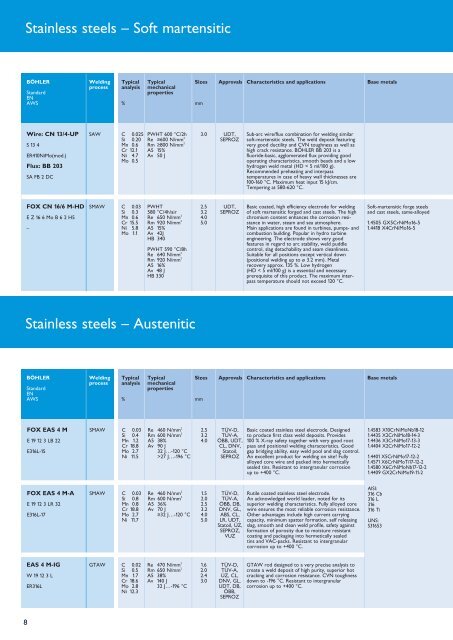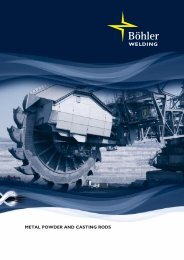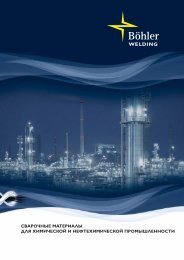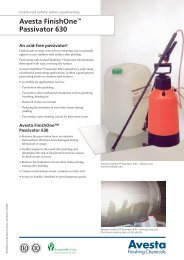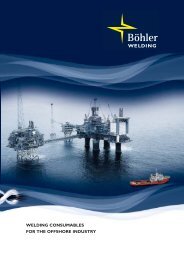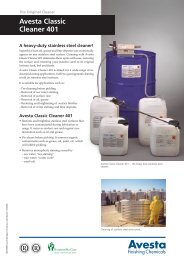WELDING Consumables for hydro power stations
WELDING Consumables for hydro power stations
WELDING Consumables for hydro power stations
You also want an ePaper? Increase the reach of your titles
YUMPU automatically turns print PDFs into web optimized ePapers that Google loves.
Stainless steels – Soft martensitic<br />
BÖHLER<br />
Standard<br />
EN<br />
AWS<br />
Welding<br />
process<br />
Typical<br />
analysis<br />
%<br />
Typical<br />
mechanical<br />
properties<br />
Sizes<br />
mm<br />
Approvals<br />
Characteristics and applications<br />
Base metals<br />
Wire: CN 13/4-UP<br />
S 13 4<br />
ER410NiMo(mod.)<br />
Flux: BB 203<br />
SA FB 2 DC<br />
SAW C 0.025<br />
Si 0.20<br />
Mn 0.6<br />
Cr 12.1<br />
Ni 4.7<br />
Mo 0.5<br />
PWHT 600 °C/2h<br />
Re ≥600 N/mm 2<br />
Rm ≥800 N/mm 2<br />
A5 15%<br />
Av 50 J<br />
3.0 UDT,<br />
SEPROZ<br />
Sub-arc wire/flux combination <strong>for</strong> welding similar<br />
soft-martensitic steels. The weld deposit featuring<br />
very good ductility and CVN toughness as well as<br />
high crack resistance. BÖHLER BB 203 is a<br />
fluoride-basic, agglomerated flux providing good<br />
operating characteristics, smooth beads and a low<br />
<strong>hydro</strong>gen weld metal (HD < 5 ml/100 g).<br />
Recommended preheating and interpass<br />
temperatures in case of heavy wall thicknesses are<br />
100-160 °C. Maximum heat input 15 kJ/cm.<br />
Tempering at 580-620 °C.<br />
FOX CN 16/6 M-HD<br />
E Z 16 6 Mo B 6 2 H5<br />
–<br />
SMAW C 0.03<br />
Si 0.3<br />
Mn 0.6<br />
Cr 15.5<br />
Ni 5.8<br />
Mo 1.1<br />
PWHT<br />
580 °C/4h/air<br />
Re 650 N/mm 2<br />
Rm 920 N/mm 2<br />
A5 15%<br />
Av 42J<br />
HB 340<br />
PWHT 590 °C/8h<br />
Re 640 N/mm 2<br />
Rm 920 N/mm 2<br />
A5 16%<br />
Av 48 J<br />
HB 330<br />
2.5<br />
3.2<br />
4.0<br />
5.0<br />
UDT,<br />
SEPROZ<br />
Basic coated, high efficiency electrode <strong>for</strong> welding<br />
of soft martensitic <strong>for</strong>ged and cast steels. The high<br />
chromium content enhances the corrosion resistance<br />
in water, steam and sea atmosphere.<br />
Main applications are found in turbines, pumps- and<br />
combustion building. Popular in <strong>hydro</strong> turbine<br />
engineering. The electrode shows very good<br />
features in regard to arc stability, weld puddle<br />
control, slag detachability and seam cleanliness.<br />
Suitable <strong>for</strong> all positions except vertical down<br />
(positional welding up to ø 3.2 mm). Metal<br />
recovery approx. 135 %. Low <strong>hydro</strong>gen<br />
(HD < 5 ml/100 g) is a essential and necessary<br />
prerequisite of this product. The maximum interpass<br />
temperature should not exceed 120 °C.<br />
Soft-martensitic <strong>for</strong>ge steels<br />
and cast steels, same-alloyed<br />
1.4505 GX5CrNiMo16-5<br />
1.4418 X4CrNiMo16-5<br />
Stainless steels – Austenitic<br />
BÖHLER<br />
Standard<br />
EN<br />
AWS<br />
Welding<br />
process<br />
Typical<br />
analysis<br />
%<br />
Typical<br />
mechanical<br />
properties<br />
Sizes<br />
mm<br />
Approvals<br />
Characteristics and applications<br />
Base metals<br />
FOX EAS 4 M<br />
E 19 12 3 LB 22<br />
E316L-15<br />
SMAW C 0.03<br />
Si 0.4<br />
Mn 1.2<br />
Cr 18.8<br />
Mo 2.7<br />
Ni 11.5<br />
Re 460 N/mm 2<br />
Rm 600 N/mm 2<br />
A5 38%<br />
Av 90 J<br />
32 J…-120 °C<br />
>27 J…-196 °C<br />
2.5<br />
3.2<br />
4.0<br />
TÜV-D,<br />
TÜV-A,<br />
ÖBB, UDT,<br />
CL, DNV,<br />
Statoil,<br />
SEPROZ<br />
Basic coated stainless steel electrode. Designed<br />
to produce first class weld deposits. Provides<br />
100 % X-ray safety together with very good root<br />
pass and positional welding characteristics. Good<br />
gap bridging ability, easy weld pool and slag control.<br />
An excellent product <strong>for</strong> welding on site! Fully<br />
alloyed core wire and packed into hermetically<br />
sealed tins. Resistant to intergranular corrosion<br />
up to +400 °C.<br />
1.4583 X10CrNiMoNb18-12<br />
1.4435 X2CrNiMo18-14-3<br />
1.4436 X3CrNiMo17-13-3<br />
1.4404 X2CrNiMo17-12-2<br />
1.4401 X5CrNiMo17-12-2<br />
1.4571 X6CrNiMoTi17-12-2<br />
1.4580 X6CrNiMoNb17-12-2<br />
1.4409 GX2CrNiMo19-11-2<br />
FOX EAS 4 M-A<br />
E 19 12 3 LR 32<br />
E316L-17<br />
SMAW C 0.03<br />
Si 0.8<br />
Mn 0.8<br />
Cr 18.8<br />
Mo 2.7<br />
Ni 11.7<br />
Re 460 N/mm 2<br />
Rm 600 N/mm 2<br />
A5 36%<br />
Av 70 J<br />
≥32 J…-120 °C<br />
1.5<br />
2.0<br />
2.5<br />
3.2<br />
4.0<br />
5.0<br />
TÜV-D,<br />
TÜV-A,<br />
ÖBB, DB,<br />
DNV, GL,<br />
ABS, CL,<br />
LR, UDT,<br />
Statoil, ÜZ,<br />
SEPROZ,<br />
VUZ<br />
Rutile coated stainless steel electrode.<br />
An acknowledged world leader, noted <strong>for</strong> its<br />
superior welding characteristics. Fully alloyed core<br />
wire ensures the most reliable corrosion resistance.<br />
Other advantages include high current carrying<br />
capacity, minimum spatter <strong>for</strong>mation, self releasing<br />
slag, smooth and clean weld profile, safety against<br />
<strong>for</strong>mation of porosity due to moisture resistant<br />
coating and packaging into hermetically sealed<br />
tins and VAC-packs. Resistant to intergranular<br />
corrosion up to +400 °C.<br />
AISI:<br />
316 Cb<br />
316 L<br />
316<br />
316 Ti<br />
UNS:<br />
S31653<br />
EAS 4 M-IG<br />
W 19 12 3 L<br />
ER316L<br />
GTAW C 0.02<br />
Si 0.5<br />
Mn 1.7<br />
Cr 18.6<br />
Mo 2.8<br />
Ni 12.3<br />
Re 470 N/mm 2<br />
Rm 650 N/mm 2<br />
A5 38%<br />
Av 140 J<br />
32 J…-196 °C<br />
1.6<br />
2.0<br />
2.4<br />
3.0<br />
TÜV-D,<br />
TÜV-A,<br />
ÜZ, CL,<br />
DNV, GL,<br />
UDT, DB,<br />
ÖBB,<br />
SEPROZ<br />
GTAW rod designed to a very precise analysis to<br />
create a weld deposit of high purity, superior hot<br />
cracking and corrosion resistance. CVN toughness<br />
down to -196 °C. Resistant to intergranular<br />
corrosion up to +400 °C.<br />
8


